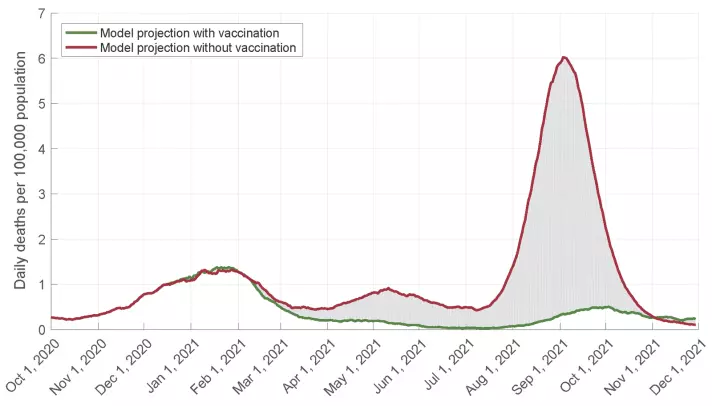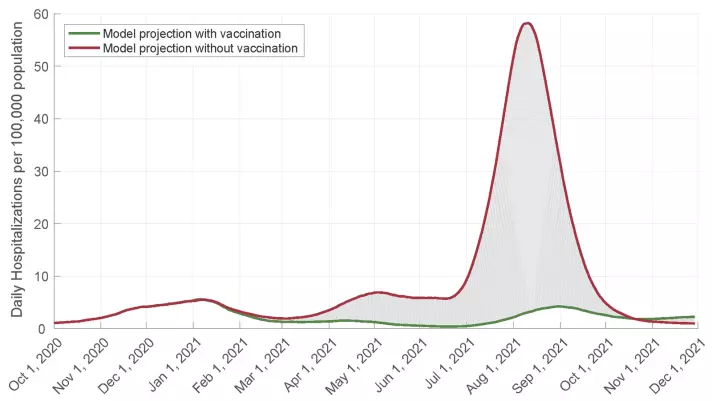Comments
- No comments found

As I have written before, the $18 billion spent on the Operation Warp Speed program to accelerate the development of COVID vaccines may well have the highest benefit-to-cost ratio of any government program that has ever existed.
Moreover, the benefits will continue to grow as more people get vaccinated here and around the world, and as future vaccines are developed based on the accumulated knowledge. Over at the Commonwealth Fund, Eric C. Schneider, Arnav Shah, Pratha Sah, Seyed M. Moghadas, Thomas Vilches, and Alison Galvani have updated their model to answer the question: “The U.S. COVID-19 Vaccination Program at One Year: How Many Deaths and Hospitalizations Were Averted?” (December 14, 2021). They write:
The U.S. vaccination program campaign has profoundly altered the trajectory of the COVID-19 pandemic, preventing nearly 1.1 million deaths. Even with only about 60 percent of Americans vaccinated to date, the nation has dodged a massive wave of COVID-19 deaths that would have started as the Delta variant took hold in August 2021. Because of Delta’s rapid and nationwide spread, deaths due to COVID-19 would have far exceeded all previous peaks. Our estimates suggest that in 2021 alone, the vaccination program prevented a potentially catastrophic flood of patients requiring hospitalization. It is difficult to imagine how hospitals would have coped had they been faced with 10 million people sick enough to require admission. The U.S. has 919,000 licensed hospital beds and typically accommodates about 36 million hospitalizations each year.
Their model predicts the death rates and hospitalization rates with and without vaccinations:


Of course, all models like this are open to question. Maybe the delta variant of COVID would not have been quite as bad for an unvaccinated population as their model predicts. If vaccines had not been available, probably alternative steps would have been taken to limit the spread of COVID in 2021–steps that would of course have had benefits and costs and tradeoffs of their own. But my point here is not to quibble over the numbers: after all, reducing deaths and hospitalizations by half of these projects, or one-tenth of these projections, would still be an extraordinary success. Instead, I want to emphasize that the COVID pandemic, awful as it has been, could have been much worse. And I’m not sure we have internalized the lessons we need to learn for the next pandemic, just in case “invent a vaccine really fast” doesn’t work so well next time.
Timothy Taylor is an American economist. He is managing editor of the Journal of Economic Perspectives, a quarterly academic journal produced at Macalester College and published by the American Economic Association. Taylor received his Bachelor of Arts degree from Haverford College and a master's degree in economics from Stanford University. At Stanford, he was winner of the award for excellent teaching in a large class (more than 30 students) given by the Associated Students of Stanford University. At Minnesota, he was named a Distinguished Lecturer by the Department of Economics and voted Teacher of the Year by the master's degree students at the Hubert H. Humphrey Institute of Public Affairs. Taylor has been a guest speaker for groups of teachers of high school economics, visiting diplomats from eastern Europe, talk-radio shows, and community groups. From 1989 to 1997, Professor Taylor wrote an economics opinion column for the San Jose Mercury-News. He has published multiple lectures on economics through The Teaching Company. With Rudolph Penner and Isabel Sawhill, he is co-author of Updating America's Social Contract (2000), whose first chapter provided an early radical centrist perspective, "An Agenda for the Radical Middle". Taylor is also the author of The Instant Economist: Everything You Need to Know About How the Economy Works, published by the Penguin Group in 2012. The fourth edition of Taylor's Principles of Economics textbook was published by Textbook Media in 2017.
Leave your comments
Post comment as a guest